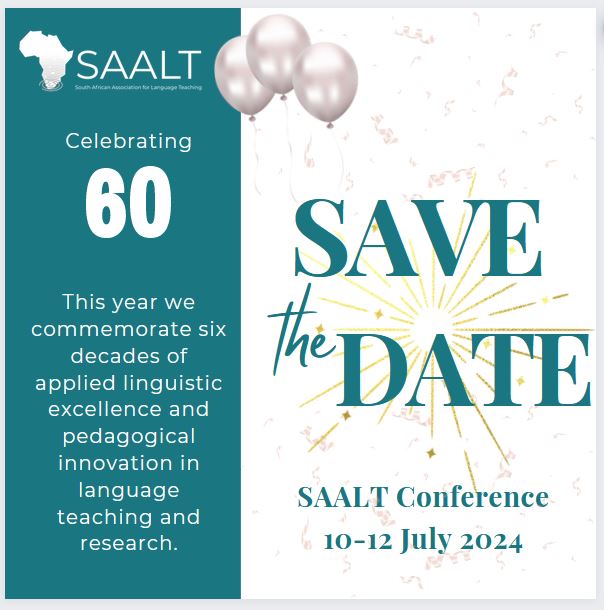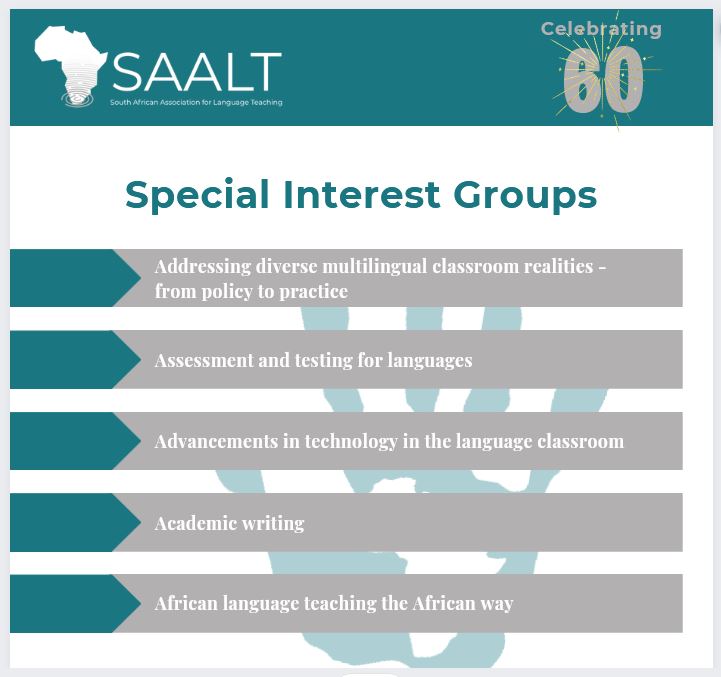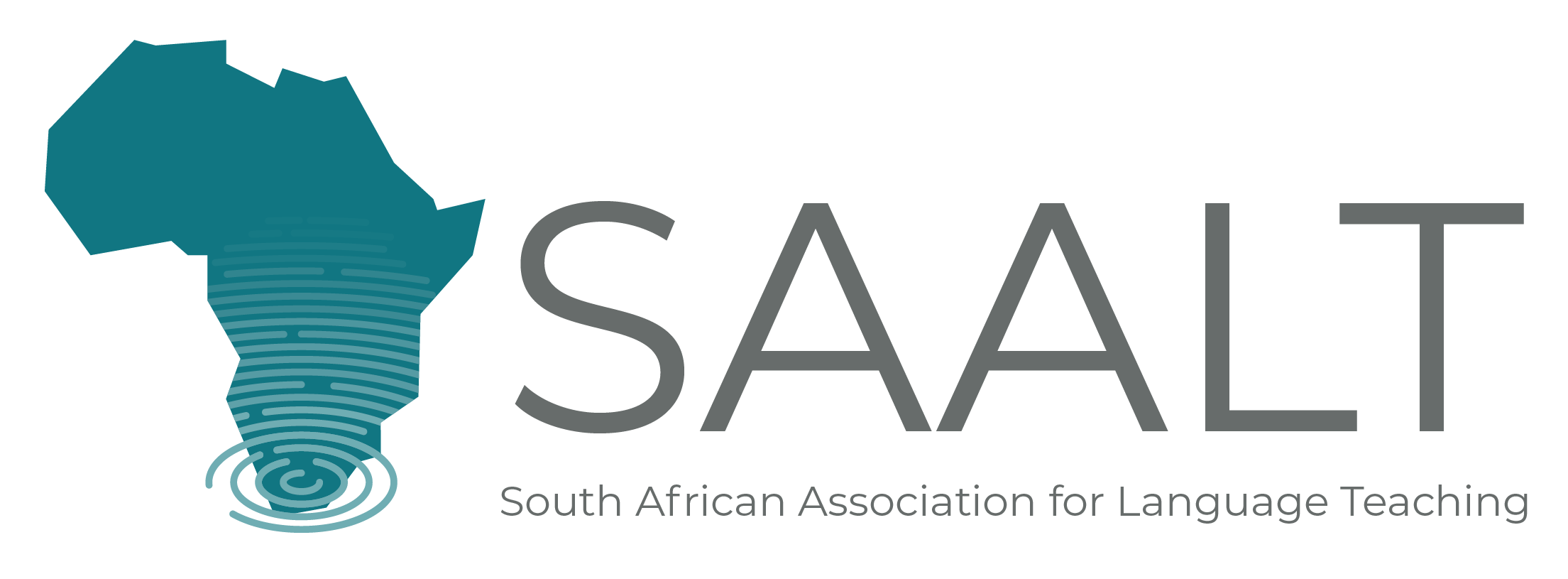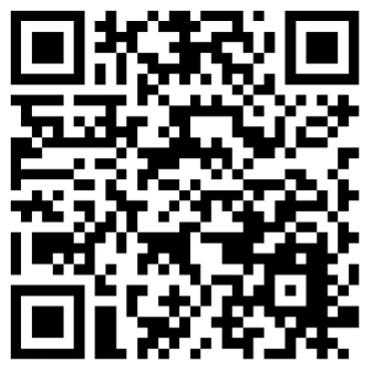SAALT Newsletter: February Edition
A Month of Linguistic Love and Celebration
Dear SAALT members and Linguistic community,
As we step into February, we are reminded of the myriad ways love can manifest. Beyond the affection shared between individuals, let us celebrate our collective passion for languages on February 21st, which marks not only the heart of the month of love but also International Mother Language Day. This day holds a particular significance in our multilingual South African context, where we take pride in the rich tapestry of our languages. It’s a moment to reflect on the beauty and diversity of languages that connect us across cultures, disciplines, and hearts.
In this newsletter, Drs Makgabo and Roux, share their thoughts with us on the importance of mother tongue education. We also provide more information about our upcoming conference, 10-12 July, in Cape Town. Finally, we provide you with information regarding the five SIGs of SAALT that you can join.
If you have any questions or thoughts that you would like to share with us, please email us at info@saalt.org.za.

Dr MC Makgabo (Deputy Chair of SAALT) would like to share the following words with you…
International Mother Language Day 2024
Mother tongue refers to the first language a person learns from childhood, and it is the language in which they have the deepest emotional and cultural association. This language is usually acquired naturally within the family or community environment, and it plays a crucial role in shaping an individual’s identity and cultural understanding.
Education in one’s mother tongue can enhance cognitive development, academic achievement, and overall learning outcomes. Learners who are introduced to education in a foreign language as a medium of instruction at primary school levels without a solid foundation in mother tongue education encounter a barrier and a lot of frustration. The barrier arises because they will have difficulties in understanding both the language and the content. Frustration is seen when learners are required to read and write, even writing becomes a huge challenge.
Using the mother tongue to communicate and to bridge learning gaps helps to develop a learner’s personal, social, and cultural identity. Such learners will develop their critical thinking, reading, and writing skills better, and gain a better understanding of the curriculum. Language is a powerful tool for building inclusion (or exclusion) at school, work, and in the community. Also, language can be a bridge to build relationships or a tool to create and maintain divisions across differences, as it is a medium for communication between individuals and groups. Therefore, learning a language other than the mother tongue is an essential component of inclusive education as it promotes intercultural understanding and tolerance and ensures respect and appreciation for different groups in society.
The success of using the mother tongue largely depends on people’s attitudes towards it. Parents and guardians play a major role in promoting the use of the mother tongue in their children’s lives. The quality of parent-caregiver interactions plays a formative role in children’s early language and learning. Communicating with the children in their mother tongue, playing with them, and reading with and for them will increase their vocabulary. Teaching children songs and explaining their meaning and significance to their culture and identity will instil a sense of pride in them. Parents can tell their children stories in their mother tongue, and in return, the children will be able to retell those stories to their peers. This is the appropriate strategy to develop children’s listening and speaking skills.
Continued learning in the mother tongue ensures faster learning and retention as it is easy to comprehend.
This is what Dr Karen Roux, PIRLS expert, from the University of Pretoria has to say about the importance of mother tongue education…
Preserving Heritage, Empowering Minds: The Vital Role of Mother Tongue Education in South Africa
In today’s globalised world, the value and importance Of promoting mother tongue languages cannot be overstated. About 40% of the global population does not have access to basic education in the language they speak at home. In South Africa, a similar picture is painted where the language of learning and teaching in the Foundation Phase can be one of 11 official languages, but a switch in the language of learning and teaching occurs at Grade 4. This switch is usually to either English, or Afrikaans.
Mother tongue languages encompass more than mere communication; they serve as repositories of culture, identity, and heritage. When individuals can both communicate and learn in their mother tongue, they develop a sense of belonging. Research indicates that children who are taught in their mother tongue develop a robust foundation for cognitive growth and subsequent academic achievement. In a multilingual and multicultural country such as South Africa, preserving and promoting mother tongue languages is imperative for fostering inclusivity and ensuring equitable educational access for all.
The Progress in International Reading Literacy Study (PIRLS) results are pivotal in tracking reading literacy proficiency across South Africa’s 11 official languages. By assessing Grade 4 learners’ reading comprehension skills, PIRLS offers valuable insights into the efficacy of educational programs, particularly in language and literacy during the early developmental stages. PIRLS not only identifies areas of strength and areas needing improvement but also illuminates disparities in language proficiency among Grade 4 learners. Analysing PIRLS data empowers policymakers, educators, and stakeholders to pinpoint language education gaps and tailor interventions to address specific needs, ultimately fostering a more literate and linguistically diverse society.
In South Africa, where linguistic diversity is a defining characteristic, leveraging the findings of PIRLS can inform policies and strategies aimed at promoting multilingualism and mother tongue education. By prioritising the development and maintenance of mother tongue languages in schools, South Africa can empower learners to embrace their cultural heritage while acquiring proficiency in multiple languages. Moreover, investing in teacher training and resources for mother tongue instruction can enhance educational outcomes and contribute to social cohesion. Ultimately, recognising the importance of mother tongue languages and utilising tools like PIRLS can contribute to building a more inclusive and equitable society where linguistic diversity is celebrated and nurtured.
Save the Date!
Upcoming Conference Reminder
We are thrilled to remind you of the upcoming conference scheduled for July 10-12 in the picturesque city of Cape Town. This event promises to be a vibrant platform for sharing insights, advancing research, and forging meaningful connections within the global linguistic community. Whether you’re a seasoned scholar or an emerging researcher, the conference offers an enriching experience that will elevate your academic and professional journey.
Abstract Submission Alert: Please be on the lookout for announcements regarding abstract submissions in the coming weeks.

Reminder:
Reminder to join a Special Interest Group (SIG)
SAALT proudly hosts five dynamic Special Interest Groups (SIGs), each tailored to the diverse interests within our community.
- Addressing diverse multilingual classroom realities
- Malephole Sefotho – malephole.Sefotho@nwu.ac.za
- Kotie Kaiser – kotie.Kaiser@nwu.ac.za
- Assessment and testing
- Kabelo Sebolai – sebolaik@cput.ac.za
- Albert Weideman – albert.weideman@ufs.ac.za
- Advancements in technology: Language teaching and assessment
- Joyce West – joyce.west@up.ac.za
- DJ Cloete – djc@akademia.ac.za
- Mariska Nel – mariska.nel@nwu.ac.za
- Academic writing
- Mariska Nel – mariska.Nel@nwu.ac.za
- Tobie van Dyk – tobie.vandyk@nwu.ac.za
- African language teaching the African way
- Connie Makgabo – connie.makgabo@up.ac.za

More information regarding the special interest groups will follow, however you are welcome to contact any of the individuals next to the groups.
In Closing
As we navigate this month of love and linguistic celebration, let’s honour the languages that articulate our thoughts, dreams, and emotions. International Mother Language Day reminds us of the significance of each tongue in our diverse nation and the world. May our shared dedication to linguistics continue to inspire and unite us in our pursuit of knowledge and understanding.
Warm regards,
SAALT Exco
P.S.
In the spirit of February, we hope you celebrate and cherish the intricate structures, the eloquence, and the profound emotions conveyed through the languages we study, teach, and expand upon. May this month reinvigorate your love for linguistics, inspire your research, and deepen your appreciation for the multitude of languages that enrich our human experience.


